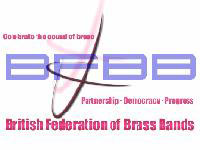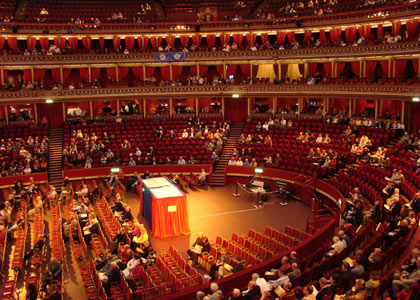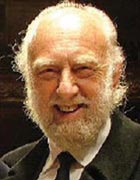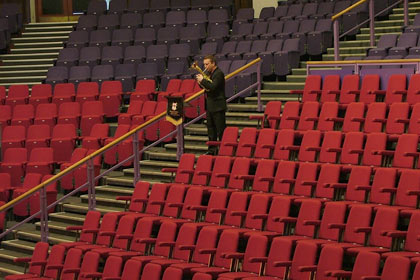4BR Time Team - 1999-2009 - The wasted decade?
8-Dec-2009Everyone seemed so upbeat as the new Millennium approached. But what actually happened to all those heartfelt wishes over the next ten years?
A decade is a very long time in banding….
At the end of the last decade of the 20th Century, the brass band world seemed ready and willing to accept innovative, inventive change.
Positive intent
Contest organisers, conductors, players and supporters seemed on the whole rather keen to see the banding movement move into the new Millennium with positive intent.
The two major banding publications at the time thought so too. Writing in British Bandsman, a group of leading personalities were asked just what they would love to see happen over the next decade or so
 Democracy
Democracy
When it came to the organisation of the banding movement in the new Millennium, David Stanley, Chairman of the British Federation of Brass Bands, argued, “…we do need a credible, democratically elected national voice.”
When Foden’s (Courtois) conductor, Nicholas Childs was asked about brass band repertoire he added: “…it would appear that the core of music we perform today is eminently similar to that of yesteryear…”
As to the question of brass band promotion?
Philip Biggs stated: “I look forward to once again picking up the challenge of enticing hitherto ‘non brass concertgoers’ – as well as the converted – to hear fine music played by some of the world’s best (bands)’
Electronic effects
And as to the question of future brass band instrumentation?
Composer Peter Graham thought about the possibility of four trombones and an additional piccolo trumpet amongst other developments. “Having heard the possibilities of electronic effects in Aagaard-Nilsen’s marvellous ‘Riffs & Interludes’, perhaps this is the next most logical extension of the brass band sound word,” he said.
Losing our audience
Meanwhile the future of contesting brought this less upbeat appraisal from Philip Morris: “I believe that we have gone as far as we can technically without losing our audiences.”
He added: “My view and hope for the future is that we will be able to combine the more traditional test piece with the desire to commission new works which are audience friendly…”
The Editor of British Bandsman proclaimed: “A new spirit of co-operation between organisations serving bands must replace the mistrust and isolationism of the past and greater support given to those with the vision and energy to take banding forward.”

Empty halls...
New music
Meanwhile, Brass Band World magazine hoped for an investment in new music.
”If brass bands are serious about engaging mainstream composers, and in particular, attracting new names, we must realise that we live in the real world,” it’s Editor firmly added.
As for the bands?
585 bands took part in the 2009 Regional Championships.
The number 1 ranked band in the world at the end of the last century was Fodens (Courtois) according to the rankings in Brass Band World magazine, although the leading band in terms of titles won was still Black Dyke who had two National and two British Open titles to their name in the 1990s decade.
The top 10 ranked bands were:
1. Fodens (Courtois)
2. Brighouse & Rastrick
3. Williams Fairey
4. Yorkshire Building Society
5. JJB Sports Leyland
6. Grimethorpe Colliery RJB
7. Tredegar
8. Black Dyke
9. NSK-RHP Ransome
10. Buy as you View Cory
 Sacked
Sacked
Meanwhile, Boosey & Hawkes ended the National Contesting Council’s contract to run the National Finals (although the accounts showed they were wound up over £50,000 in the bank – its constitution revealing that the money could only be passed on for the benefit of future Nationals)
The BFBB took over the running with the claim, “The Federation is in the best position to manage the event…”
NCC General Secretary Alan Hope, said he was ‘disgusted’ by the developments.
Figures showed that Lottery Funding had handed out almost £14 million to bands and banding organisations.
Retirement
And a few other things…
Richard Evans (right) announced his retirement from contest conducting, Brass in Concert fended off calls for a change to its marking system, Boosey & Hawkes were grilled on television about the poor quality of their instruments and Black Dyke declined an invitation to the All England Masters.
What happened next...
This is what happened over the following decade….
David Stanley’s wish did not come true. There is still no elected national voice. The BFBB remains in place, yet by common consent shows little desire to lead the banding movement into a democratically inspired future.
As for brass band repertoire?
 New music
New music
Paul Hindmarsh’s inspired efforts in promoting new music at the flagship RNCM Festival of Brass, remains a cause for celebration.
However, at the British Open, National and All England Masters, just 13 new commissions have been used in the 30 contests that have taken place since 2000.
Of those, Peter Graham (right) Martin Ellerby and Michael Ball have produced six between them, with the others coming from Edward Gregson, Bram Tovey, John Pickard, Jan Van der Roost, Kenneth Downie, John McCabe and Philip Wilby.
Composers
Internationally renowned composer James MacMillan has stated he will write for brass bands – but only for Black Dyke, whilst Michael Nyman’s invitation to write for the British Open still appears to be stuck in the post, after he said he would love to do it – and for free.
Electronic music (of a sort) has been heard with whale song in Paul Lovatt-Cooper’s ‘Within Blue Empires’ for the 2009 English National Championships, whilst the use of trumpets as becomes the norm at Brass in Concert.
There has been no move towards the inclusion of four trombones or the addition of a piccolo trumpet.
Audiences
Anecdotal evidence suggests that audiences for the major brass band contests have continued to decline (Brass in Concert being the exception).
There were reports that the National Championships at the Royal Albert Hall sold just over 50% of the tickets for its event, whilst the rows of empty seats at the British Open, Masters, English National etc told their own story.

Playing to ourselves...
Co-operation
A new spirit of co-operation does not seem to have materialised.
In 2010 the RNCM Festival of Brass will take place on the same weekend as the Butlins Mineworkers Championship, the Scottish Open will take place at the same time as Brass in Concert, and a number of the Regional contests are clustered together on the same weekends.
The role of the Association of Brass Band Adjudicators has been brought into question, as has the question of ‘ownership’ of the National Finals.
As for the top 10 ranked bands?
The 4BR/World of Brass Rankings now has a top 10 of:
 1. Cory
1. Cory
2. Black Dyke
3. Fodens
4. Grimethorpe
5. Brighouse & Rastrick
6. Leyland
7. Rothwell Temperance
8. Treize Etoiles
9. Stavanger
10. Carlton Main Frickley
Gone
In the last decade Ransome has totally disappeared and YBS has dropped into the First Section and become Hammonds Saltaire. Fodens, Fairey, Leyland, Grimethorpe and Cory have either changed name or lost their sponsorship connections.
484 took part in the 2009 Regional Championships.
The most successful bands of the decade have been Cory and Black Dyke (7 major championships each).
Belly up
Boosey & Hawkes went belly up, the BFBB lost the right to host the Nationals after the biggest cock up in Torquay since Fawlty Towers, and Lottery funding dried up amid questions about many an application and the lack of associated ‘youth band’ development that never quite materialised.
4BR
The Salvation Army became increasingly influential in secular banding matters, cheap imported brass instruments became increasingly popular (and very similar in design to more established brands), the British Federation of Brass Bands became the promoter of an exclusively English National Championship, Black Dyke entered their first new contest since 1978, Brass in Concert still fended off requests to change its marking system and Richard Evans continued to conduct winning bands at the highest level.
Oh – and 4barsrest.com started up too.
A decade is a very long time in brass banding …
Iwan Fox















